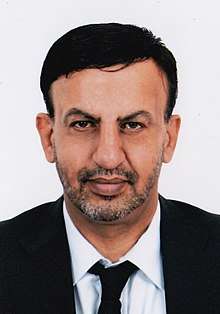Hashmat Ghani Ahmadzai
Hashmat Ghani Ahmadzai (Pashto/Dari: حشمت غنی احمدزی) is an Afghan politician who is the Grand Council Chieftain of the Kuchis.[1][2] Ghani oversees the Ahmadzai, one of the largest Pashtun tribes, a significant portion of which resides on the southeastern side of the border in Waziristan, Pakistan.[3] Ghani was a candidate in the 2014 presidential election that was won by his elder brother, Ashraf Ghani.[4]
Hashmat Ghani Ahmadzai حشمت غنی احمدزی | |
|---|---|
 Hashmat Ghani Ahmadzai in December 2011 | |
| Grand Council Chieftain of the Kuchis | |
| Personal details | |
| Born | 29 October 1960 Logar, Afghanistan |
| Political party | Independent |
| Spouse(s) | Farrah Ghani |
| Relations | Ashraf Ghani (brother) |
| Children | Sultan Ghani Amel Ghani Hannah Ghani |
| Website | HashmatGhaniAhmadzai |
Early years
Ghani was born on October 29, 1960 in the Logar Province of Afghanistan. An ethnic Pashtun from the Ahmadzai tribe of the Ghilji, Ghani’s grandfather brought King Zahir Shah’s father, King Mohammed Nadir Shah, into power in the early 20th century.[5] His father served King Zahir Shah in many ministerial roles, last holding the title of Minister of Transport from the late 1950s until the King was deposed in 1973. Following the overthrow of the King's government, Ghani and his family joined the former King and royalists in exile as part of what came to be known as the Rome Group, which flourished as a political organization though it was not a formal political party.[6]
Grand Council Chieftain of the Kuchis
Hashmat Ghani Ahmadzai, chief of the Grand Council of Kuchis, is among the wealthiest and most influential Kuchis, thanks to a large family inheritance based on land ownership as well as a successful transport company. He is also a vice president of an American security and reconstruction company. As chief of the Kuchi council, which represents the interests of largely settled Kuchi tribes, Ghani deals with important Afghan politicians, including former President Hamid Karzai. But he says ideas he has put forward to improve life for the poorest nomads, such as providing community centers and integrating them into settled societies, Ghani advocated the establishment of an office for nomadic affairs within Karzai's administration. The office, according to Ghani's vision, would help mediate land disputes and work to build trust among Kuchis and northern ethnic groups.[7] He became the Grand Council Chieftain of the Kuchis in 2002.
Personal life
Brother of Ashraf Ghani Ahmadzai, the current president of Afghanistan.[8]
Ghani was married to Farrah Ghani, she passed away amid battling cancer. He has three children.
His eldest son, Sultan Ghani received his Bachelors in International Business at Marymount University and holds a graduate certificate in International Business Management from Georgetown University.
See also
References
- "Poverty, violence put Kuchi nomads on road to nowhere". Union Democrat. May 30, 2006. p. 4B. Retrieved 13 May 2011.
- "Members of the afghan constitutional loya jirga". e-Ariana. Ariana Media. Afghaniyat NewsGroup. December 23, 2003. Archived from the original on 8 May 2011. Retrieved 13 December 2014.
- "Kuchis Losing Their Way - Institute for War and Peace Reporting - P142". Archived from the original on 2014-04-08. Retrieved 13 December 2014.
- "Hashmat Ghani: Quiet storm of the Afghan vote - Features - Al Jazeera English". aljazeera.com. Retrieved 13 December 2014.
- "Hashmat Ghani Ahmadzai". politicalpast.com. Retrieved 13 December 2014.
- "Database". afghan-bios.info. Retrieved 13 December 2014.
- Coll, S. (2004). Ghost Wars: The Secret History of the CIA, Afghanistan, and Bin Laden, from the Soviet Invasion to September 10, 2001. Penguin Press. p. 285. ISBN 9781594200076. Retrieved 13 December 2014.
- "Exit Hamid Karzai, Afghan Legend · Global Voices". globalvoices.org. Retrieved 13 December 2014.